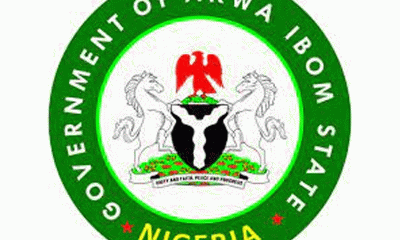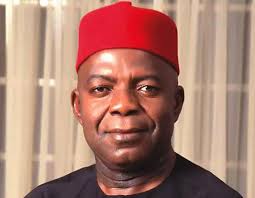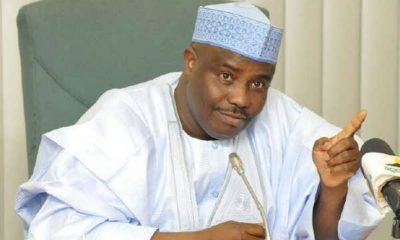COVER
Besides N41trn Public Debt, FG Owes CBN $47bn – Report

By Joseph Amah, Abuja
The federal government has confirmed that it was owing the Central Bank of Nigeria (CBN) N20 trillion ($47 billion), which is yet to be added to the country’s outstanding public debt, according to a report by the Budget Office of the Federation.
This is coming as a Think-Tank backed by the Bill & Melinda Gates Foundation is seeking $50 billion in aid to help debt-ridden African countries re-enter capital markets and avoid future defaults.
The debt figure was as of March 31, the Budget Office said, in a document, which gave the details of the country’s expenditure plans from 2023-2025.
The document was posted on the Budget Office’s website at the weekend.
Nigeria’s outstanding public debt is N41.6 trillion.This is even as Director General of the Debt Management Office, Mrs Patience Oniha raised the alarm that the nation’s high debt levels with a corresponding high debt service figures was a major constraint to further investments in the country’s deteriorating infrastructure.
Even with the additional obligations, the country remains “within Nigeria’s self-imposed” limit of 40 per cent debt to Gross Domestic Product (GDP), according to the report quoted by Bloomberg. The government plans to securitise its Ways and Means Advances (WMAs) from the CBN and revamp “it into a longer tenor amortising facility with a lower interest rate,” according to the Budget Office.
The country barely earned enough revenues to cover debt service payments in 2021, according to the budget office while in the first four months to April, government income of N1.63 trillion was less than the N1.94 trillion needed to cover debt-service payments, Minister of Finance, Budget and National Planning, Mrs Zainab Ahmed said, according to a presentation on the budget office’s website.
While the debt portfolio remains vulnerable to revenue and export shocks, “the challenges are being addressed by the government through its ongoing strategic revenue growth initiatives,” the report added.
Meanwhile, a think-tank backed by the Bill & Melinda Gates Foundation is seeking $50 billion in aid to help debt-ridden African countries re-enter capital markets and avoid future defaults.
The amount is an “average estimate,” said the President of the Paris-based Finance for Development Lab, which was launched last month, Daniel Cohen. Cohen, who is also President of the Paris School of Economics, said the money would be used to “enhance” credit quality by providing guarantees and helping African commodity exporters and importers hedge against price volatility.
Some African countries, which hit capital markets as global interest rates plunged to a record low, are on the verge of default due to the economic impact of the COVID-19 pandemic and Russia’s invasion of Ukraine, Bloomberg reported.Sovereign dollar bonds from African countries trade on average at 1,007 basis points above the US Treasury yield, meeting the widely accepted definition of a debt crisis.
The laboratory, which develops the proposals and wants an established body to hold the facility, includes representatives from the Steering Committee of the United Nations Economic Committee for Africa and think tanks from Santiago and Accra to New Delhi. World Trade Organisation (WTO) Director-General Ngozi Okonjo-Iwela attended its launch, the report said.
The Gates Foundation provided $2.6 million in September 2021 to start the project, the Bloomberg report recalled.
“Last year, we interacted with passionate thinkers from the Paris School of Economics who brought new ideas and energy to the funding debate – from Francophone Africa to the Paris Club to the private sector,” the foundation said in a response to questions.
“We jointly thought of a new organisation with the vision of creating an engaged community of think tanks and research centres that could help provide innovative, yet practical and evidence-based proposals meeting today’s financial challenges,” it added.
Cohen said he had begun talking to politicians, including French leaders, about contributions to the fund, noting that the contribution could come in the form of International Monetary Fund (IMF) special drawing rights.
The lab is proposing rolling interest-payment guarantees and loan-restructuring and facilitation facilities to provide cash “sweet” to creditors to cut the length and cost of restructuring negotiations, a document said.
Cohen said such a mechanism is necessary to help countries re-enter the market.
“Either they are locked out of the market or they can re-enter, provided they are enhanced by some sort of guarantee. Such a mechanism would be needed to restore access to the market. There will be a lot of restructuring in the coming years. Some cash can be a big advantage,” Cohen stressed.
The alternative is that countries locked out of capital markets will have to rely on grants and multilateral development banks for their financial needs, he explained.
The lab is also offering protection against commodity volatility by guaranteeing margin call payments triggered by rising prices, explaining that the laboratories also plan to develop relationships with Chinese academics as many African countries are indebted to China.
“We are thinking of a parallel group of Chinese scholars thinking about the role of China’s main creditor in Africa,” he said.
High Debt Weakening Investment in Infrastructure –DMO
.
The DG, Debt Management Office position was contained in a document presented during a workshop for civil society organisations organised by the SFTAS programme coordination unit held in Abuja entitled, ‘Why Debt Sustainability Is Important at the Subnational Level in Nigeria: Challenges and Prospects’ and a copy of it was obtained DAILY ASSET.
According to the DMO DG, “High debt levels lead to heavy debt service which reduces resources available for investment in infrastructure and key sectors of the economy.”
In the document, she stressed the need for debt sustainability, which she defined as the ability to service all current and future obligations, while maintaining capacity to finance policy objectives without resort to unduly large adjustments or exceptional financing such as arrears accumulation, debt restructuring, which could otherwise compromise its stability.
She added that, “A country’s public debt is considered sustainable if the government is able to meet all its current and future payment obligations without recourse to exceptional financial assistance or going into default.”
However, despite the high debt service, the DMO has constantly insisted on the sustainability of Nigeria’s rising debt, using the debt to Gross Domestic Product ratio as justification.
The International Monetary Fund (IMF) had earlier warned that debt servicing might gulp 100 per cent of the Federal Government’s revenue by 2026 if the government failed to implement adequate measures to improve revenue generation.
According to the IMF’s Resident Representative for Nigeria, Ari Aisen, based on a macro-fiscal stress test that was conducted on Nigeria, interest payments on debts might wipe up the country’s entire earnings in the next four years.
Aisen said, “The biggest critical aspect for Nigeria is that we have done a macro-fiscal stress test, and what you observe is the interest payments as a share of revenue and as you see us in terms of the baseline from the federal government of Nigeria, the revenue of almost 100 per cent is projected by 2026 to be taken by debt service.
“So, the fiscal space or the amount of revenues that will be needed and this without considering any shock is that most of the revenues of the federal government are now, in fact, 89 per cent and it will continue if nothing is done to be taken by debt service.”
However, The Minister of Finance, Budget and National Planning, Dr Zainab Ahmed, recently disclosed that Nigeria’s debt service cost surpassed its revenue in the first four months of this year.
Debt service gulped N1.94tn between January and April 2022, against a retained revenue of N1.63tn.
A copy of the public presentation of the 2022 approved budget by the finance minister showed that the Federal Government allocated N3.32tn for debt servicing in 2021.
However, the minister’s presentation document showed that a total of N4.2tn was spent on debt servicing in 11 months, indicating a difference of N1.15tn or 37.9 per cent of the money allocated for debt servicing for the period.
In October last year, the finance minister, during an interview with Bloomberg TV, said, “Our debt service to overall revenue is high because we have a very large expenditure base. We have a large proportion of our budget dedicated to payroll, and Mr President had decided from the beginning of his administration that we were not going to disengage staff.
“So, you have to pay salaries, you have to pay pensions. And also, we have to fund the other arms of government, which are the judiciary and the legislature.”
COVER
FG Disburses N5.12bn Pension Arrears to 90,689 DBS Pensioners

By Tony Obiechina, Abuja
The Federal Government has released funds for the disbursement of N5.12 billion in pension arrears to 90,689 Defined Benefit Scheme (DBS) pensioners under the Pension Transitional Arrangement Directorate.This was contained in a statement by the Head of Corporate Communications of PTAD, Olugbenga Ajayi.
He said that the directorate had finalised the disbursement of the money. The Nigeria Customs Service, the Nigeria Immigration Service, and Prisons Pension Department (CIPPD) pensioners are 8,626, received N276,032, for one-month arrears; the Police, Pension Department (PPD) pensioners are 9,681, received N619,584, for two months as arrears. The Civil Service Pension Department (CSPD) pensioners are 12,773, received N408,736, for one-month arrears, and the Parastatals Pension Department (PAPD) pensioners are 59,609, received N3,814,He said that the payment reaffirms the administration’s commitment to ensuring that pensioners receive their due entitlements in line with the Renewed Hope Agenda of President Bola TinubuAccording to the statement, the approvals align with the President’s Renewed Hope Agenda.“This move shows President Tinubu’s strong commitment to senior citizens’ welfare and marks a new era in DBS pension management,” said PTAD, Executive Secretary, Tolulope Odunaiya.Among the key measures is the immediate implementation of an extra budgetary allocation to enforce new pension rates for DBS pensioners.The President also endorsed the adoption of a proposed pension harmonisation policy, which will be incorporated into the 2026 pension budget. Additionally, health insurance coverage for all DBS pensioners has been approved, ensuring access to essential healthcare services.The proposed reforms include a new pension rate of N32,000 and incremental increases of 10.66% and 12.95% for pensioners from defunct and privatised agencies. Other components of the reform package include harmonisation of pension rates across all DBS pensioners and their enrolment into the National Health Insurance Scheme (NHIS).In June, PTAD announced the successful disbursement of N8.6 billion in pension arrears to 148,625 eligible DBS pensioners across various sectors. The payments reflect the implementation of the N32,000 pension increment approved by President Tinubu in 2024.PTAD had previously settled arrears related to the first pension increment of 20% to 28%, which came into effect in January 2024.COVER
NAF Offensive Decimates 592 Terrorists, Destroys 372 Assets in Eight Months

By David Torough, Abuja
The Nigerian Air Force (NAF) has killed no fewer than 592 terrorists and destroyed 372 enemy assets in Borno within the last eight months, surpassing the total operational gains recorded in 2024.A statement by NAF’s spokesman, Air Commodore Ehimen Ejodame yesterday said the Chief of the Air Staff (CAS), Air Marshal Hasan Abubakar, said this during a courtesy visit to Gov.
Babagana Zulum of Borno. Abubakar said the offensive had destroyed 206 technical vehicles and 166 logistics hubs in deep hostile territory, with coordinated day-and-night strikes from Gonori to Rann, Dikwa to Damboa, Azir to Mallam Fatori.He said the offensive had been boosted by the deployment of A-29 Super Tucano aircraft capable of precision and night missions, Mi-171 helicopters for medical evacuation and logistics, and enhanced intelligence, surveillance and reconnaissance platforms for round-the-clock target tracking.He added that a new Mi-35 gunship was expected to further intensify close-air support for ground troops in the theatre.“Backed by an upgraded fleet and precision night-strike capabilities, NAF aircraft executed 798 combat sorties, clocking over 1,500 operational flight hours in the Air Component of Operation Hadin Kai.“This year, our air war is faster, sharper, and more surgical.“We are taking out high-value targets, crippling their logistics, and hunting down every cell that threatens the peace of the North-East,” he said.The CAS also praised the “Borno Model” of combining community-driven non-kinetic measures with decisive military action, saying it had proven effective in the counter-insurgency campaign.He also inspected facilities at the NAF Base, met with aircrew and ground personnel, and received operational briefings.He reaffirmed the NAF’s commitment to precision air power, intelligence-led operations, and inter-agency collaboration to protect Nigerians.In his response, Gov. Zulum praised the NAF for its sustained air support in degrading terrorist capabilities and protecting communities.According to him, the NAF has been a steadfast partner in their fight against insurgency.“Your operations have saved countless lives and allowed our communities to begin rebuilding.“The people of Borno recognise your sacrifices and stand firmly behind you,” he said.COVER
Over 8,000 Mentally ill Inmates in Custody Nationwide, Says NCoS

By Divine Ndukwe, Abuja
The Nigerian Correctional Service (NCoS) has disclosed that at least 8,246 inmates across the country’s custodial centres are living with mental health conditions.Assistant Controller General of Corrections in charge of Medical Services, Dr.
Glory Essien, revealed the figures yesterday in Abuja during the third public hearing of the Independent Investigative Panel on Alleged Corruption, Abuse of Power, Torture and Other Inhumane Treatment by the NCoS. Essien described incarceration as a deeply stressful experience, noting that the loss of freedom can trigger or worsen mental health conditions. She explained that inmate-leaders are trained to identify and report cases of psychological distress for early intervention, but available resources remain insufficient.“If you’re in a facility housing 500 to 1,000 inmates, with just one doctor or psychologist, monitoring everyone individually is impossible,” she said, citing logistical and funding challenges that hamper adequate care.Similarly, the NCoS Assistant Controller General in charge of Pharmaceutical Services, Mohammed Bashir, acknowledged that drug shortages and limited staffing remain major obstacles despite government funding.He revealed that a psychological services unit has been established, partnering with psychiatric associations to visit major facilities, though resources still fall short of demand.Permanent Secretary in the Ministry of Interior, Dr. Magdalene Ajani, called for urgent private sector support, stressing the need to deploy more psychiatric professionals to underserved states. “Please come to Macedonia and help us,” she appealed to the Nigerian Medical Association and pharmaceutical companies.Meanwhile, in Kwara State, the Nigerian Medical Association (NMA) has expressed alarm over rising mental health issues among doctors, linking the trend to burnout, workplace violence, and poor working conditions.Kwara NMA Chairman, Prof. Olushola Abdulrahman Afolabi, said a significant proportion of doctors experience depression, anxiety and other psychiatric disorders, often without seeking help due to stigma.Former NMA chairman, Prof. Issa Baba Awoye, warned that current figures could be worse than past studies, especially in resource-poor settings.The NMA is advocating for mandatory mental health evaluations for doctors, alongside increased awareness and stigma reduction campaigns. “Our healthcare system can only be as strong as the mental and physical well-being of those who sustain it,” Afolabi stated.Both the NCoS and NMA agree that mental health care must be prioritized, not just for inmates, but for those tasked with caring for the nation.

























